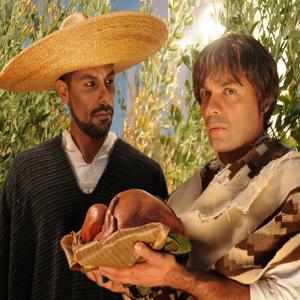Extreme hunger leads a man to a drastic decision in the play Macario, making its world premiere at Teatro Visión. The production marks the company’s return to the stage after an absence of several years. Playwright Evelina Fernandez and Teatro Visión adapted this magical realist tale, set in 18th-century colonial Mexico, from a 1950 novella by author B. Traven (The Treasure of the Sierra Madre) and from a well-received Mexican film.
Macario was co-directed by Rodrigo Garcia and Elisa Marina Alvarado. As she says in the program notes, Alvarado had a brush with “the land of the dead” after suffering an aneurysm last year. The Teatro Visión co-founder seems to have returned full-bore to the stage with this ambitious production.
In spite of its relatively recent source material, Macario evokes a sense of long tradition. Original music by Russell Rodriguez, performed by an onstage trio, sets the scene beautifully. The compositions draw on old Mexican folk influences but also have contemporary elements, and the music helps pull viewers into the story.
Macario emphasizes the chasm between haves and have nots, one widened by a caste system in which Spanish colonizers enjoy wealth and power while Mexico’s indigenous people struggle.
Preparations for Day of the Dead festivities only underscore the poverty of woodcutter Macario (Hugo Carbajal) and his large family, who are always near starvation. Macario, regularly sneered at in town as an “indian,” sells firewood, while his wife (Karina Gutierrez) earns a pittance washing clothes for the gentry.
As villagers dance in the square with bright ropes of marigolds and create Day of the Dead altars loaded with sugar skulls, candles and the favorite foods of deceased loved ones, Macario can’t participate: he has no money for candles, and it’s hard to spare food for an offering.
After witnessing a procession of roast turkeys carried to the local don’s house, he succumbs to frustration. Fantasizing about the impossible luxury of eating an entire turkey by himself—not sharing with his wife or kids—he vows never to eat again unless this dream is fulfilled.
Carbajal captures Macario’s anguish while keeping the character affable and sympathetic, even as he won’t budge from a decision certain to doom his family. Gutierrez conveys a likable strength throughout the play, especially as her character fights to keep Macario from giving in to despair. And as dire as the conditions are for the hero and his family, the story unfolds with touches of humor—it’s a fable, but grounded with a sense of humanity.
Macario does get his fantasy meal, and the Devil, God and Death show up in turn and ask for a share. Whereas the Devil and God make appeals, respectively, to greed or charity, Death appears dressed as a fellow peasant; he’s the only one whom Macario obliges. In return, Death grants the woodcutter powers to heal the sick … but there’s a catch.
Eddie Aguirre plays Death with a slow grace and expansive manner that make it easy to trust, rather than fear, the Reaper.
This story has many scenes that take place in different locations, and Macario suffers a bit from a high volume of set changes that slow the play’s momentum.
The impact of Macario’s poverty is lessened by the sheer amount of time required to arrange the furniture and props of his home. Even the meager contents of a peasant’s hut take valuable stage time to set up, creating the false sense that materially Macario has more, not less, than most.
The production is at its best in more minimalist, inventive scenes. A troupe of dancers are quite effective in acting as a kind of chorus. They portray everything from shambling skeletons that assist Death and herald the arrival of spirits, to faceless dark shapes that whirl around other characters, foretelling menace.
A visit to Death’s candle-filled cave offers one of the most visually striking scenes in the play, with shrouded cast members adding an eerie sense of movement.
Macario is performed entirely in Spanish, and for audience members who don’t know the language, like myself, I found that it helped to have an idea of the story beforehand. The production does feature English supertitles, but at least on the night of my visit, these had a tendency to get out of sync with the action on stage.
However, it’s not necessary to catch every word to appreciate Macario’s tale. Its themes of compassion, with a definite carpe diem undercurrent—after all, Death is not only a key character in this play, but celebrated as a part of life—are easy to understand.
Macario plays Thu-Sat, 8pm, Sun, 2pm thru Oct 20 at the Mexican Heritage Plaza, San Jose. Tickets are $15-$20 advance/$20-$25 at the door. teatrovision.org.

 Chromatic Coffee Celebrates First Anniversary
Chromatic Coffee Celebrates First Anniversary  Concert Venue Coming to St. James Park?
Concert Venue Coming to St. James Park? 


